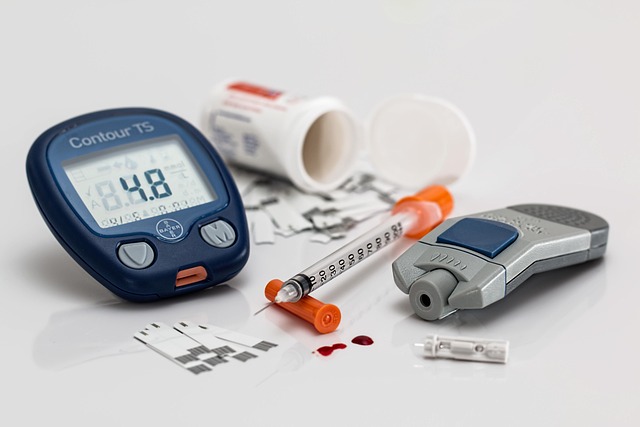Cholesterol blood tests in the UK are essential for gauging heart health, identifying high 'bad' LDL cholesterol levels that elevate stroke and heart disease risks. Recommended for over 40s or those with risk factors like obesity or high blood pressure, these tests help manage LDL levels through lifestyle changes, promoting beneficial HDL cholesterol. Regular testing, tracking results, and interpreting them accurately are crucial steps in preventing cardiovascular events.
In the UK, cholesterol-related conditions are prevalent, making it crucial to understand and manage cholesterol levels. A simple blood test is a powerful tool for monitoring your heart health. This article guides you through the process, from comprehending cholesterol’s impact on the body to interpreting test results. Learn how regular cholesterol blood tests can help prevent cardiovascular diseases and explore effective strategies for managing your cholesterol levels naturally.
- Understanding Cholesterol and Its Impact on Health
- How a Simple Blood Test Can Help Monitor Cholesterol
- Interpreting Results and Managing Cholesterol Levels Effectively
Understanding Cholesterol and Its Impact on Health
Cholesterol is a waxy, fat-like substance found in all cells of our bodies, playing a crucial role in maintaining good health. It’s essential for building cell membranes and producing hormones. However, high cholesterol levels, particularly ‘bad’ LDL cholesterol, can have detrimental effects on our cardiovascular system. In the UK, cholesterol blood tests are widely used to assess heart health as they help identify elevated LDL cholesterol, which increases the risk of heart disease and stroke. Regular testing is recommended for individuals over 40 or those with risk factors such as obesity, high blood pressure, or a family history of cardiac issues.
Understanding your cholesterol profile through a simple blood test can empower you to make informed decisions about your lifestyle. In terms of cholesterol blood tests UK residents can access, these typically measure total cholesterol, LDL (low-density lipoprotein) cholesterol, HDL (high-density lipoprotein) cholesterol, and triglycerides. High LDL levels can be reduced through diet, exercise, and sometimes medication, while maintaining or increasing HDL levels is beneficial as it helps remove LDL cholesterol from arteries.
How a Simple Blood Test Can Help Monitor Cholesterol
A simple cholesterol blood test in the UK is a powerful tool for monitoring and managing your cardiovascular health. This non-invasive procedure allows healthcare professionals to measure the levels of low-density lipoprotein (LDL) and high-density lipoprotein (HDL) cholesterol in your blood, providing valuable insights into your overall cholesterol profile. Regularly checking your cholesterol levels is essential for early detection of abnormal readings, which can be a red flag for potential heart disease or stroke risks.
By comparing these results over time, individuals can track their progress and make necessary lifestyle adjustments. For instance, if a patient’s LDL cholesterol levels are high, indicating ‘bad’ cholesterol, the doctor might recommend changes to diet and exercise routines to lower them. This proactive approach, facilitated by the Cholesterol Blood Test UK, empowers individuals to take control of their health and reduce the risk of cardiovascular events.
Interpreting Results and Managing Cholesterol Levels Effectively
Interpretation of your cholesterol blood test results is a crucial step in managing your heart health. In the UK, healthcare professionals typically use units of milligrammes per decilitre (mg/dL) to measure total cholesterol levels. Optimal cholesterol levels are below 5.0 mg/dL. If your result falls between 5.0-6.0 mg/dL, it’s considered borderline high and you may need to make lifestyle changes. Levels above 6.0 mg/dL require immediate attention as they significantly increase the risk of heart disease.
Managing cholesterol levels effectively involves a combination of diet, exercise, and sometimes medication. A balanced diet low in saturated and trans fats can help lower bad (LDL) cholesterol levels. Regular physical activity, such as brisk walking or swimming, boosts your good (HDL) cholesterol levels while reducing LDL. If lifestyle changes aren’t enough, healthcare providers may prescribe medications like statins to manage high cholesterol levels effectively. Remember, regular cholesterol blood tests in the UK are essential for maintaining heart health and preventing long-term complications.
A cholesterol blood test, such as those available across the UK, is a powerful tool for anyone looking to take control of their heart health. By understanding your cholesterol levels and taking appropriate action, you can significantly reduce the risk of cardiovascular disease. Regular monitoring, guided by simple blood tests, allows for effective management through lifestyle changes or medical interventions, ensuring a healthier future.
